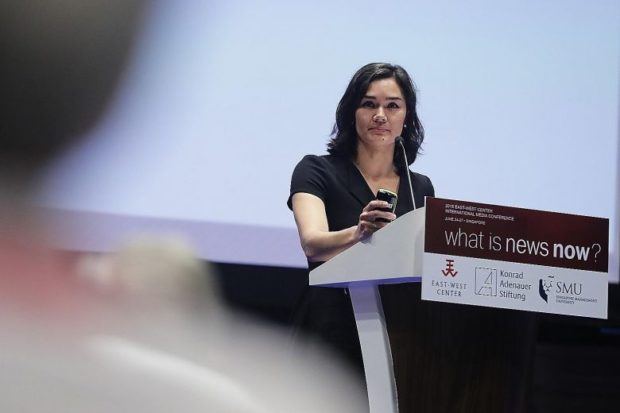US diplomat grilled over defense of Trump’s media criticism

US Assistant Secretary of State for Public Affairs Michelle Giuda maintained that the US remains committed to press freedom and fended off questions on President Donald Trump’s treatment of the media. STRAITS TIMES PHOTO
SINGAPORE — US President Donald Trump has assailed the media, and called outlets that don’t depict him favourably “fake news.”
And a number of journalists from around the world at an international media conference this week are concerned that this will embolden other countries to clamp down on the press.
But a senior State Department official maintained yesterday that the United States remains committed to press freedom, in the face of skepticism from the audience of 350 media professionals. “Our goal in the US is to help defend that right – open and free press, freedom of speech – and to help advance our values and help our partners in other countries do the same thing,” Ms Michelle Giuda, Assistant Secretary of State for Public Affairs, said at the East-West Centre’s International Media Conference.
She outlined her government’s efforts to engage journalists, identify and counter disinformation, and promote media literacy skills in countries such as Myanmar, where US diplomats have spoken to governments about the importance of a free and open press, and called for fair treatment of journalists.
But moderator Donna Leinwand Leger, former managing editor of USA Today, pointed out that Mr Trump “often denounces coverage he doesn’t like as fake news, which is not the kind of message you are bringing here”.
To applause from the audience, she said: “It contradicts it. It undermines the media. And it is a tactic that has been used in this region to squelch the press. How does the State Department continue to bring its message when the President is setting a bit of a poor example?”
The fact that this debate can happen is one of the most powerful things about the US, countered Ms Giuda, who for close to 20 minutes fended off questions on Mr Trump’s treatment of the media and its repercussions on press freedom and trust in the media.
“The President has been very clear in calling out unfair or inaccurate news when he sees it, as is his right to do. As is the right of every single US citizen,” she said. “It is out in the public. And now it is up to the American people to decide… We are having a healthy dialogue about it.”
Journalists rose to point out that the US President and government are a source of disinformation, and they fear other leaders would be empowered to deride the press as well.
The Bill of Rights protects the rights to freedom of speech and the press, Ms Giuda added. Ms Leger wondered whether this debate was a fair one, drawing a swift response from Ms Giuda, who said people were free to post what they wanted on social media – especially in the US – because of freedom of speech.
At a later panel, Hong Kong Baptist University professor Cherian George said one silver lining of the Trump presidency is that because he has unsettled the media establishment, “they are finally taking disinformation seriously”.
It was a debate that should have begun earlier, he added, citing the falsehood that Saddam Hussein’s Iraq had weapons of mass destruction as “the single most damaging, destructive, fatal instance of disinformation” which led to the US invasion of Iraq in 2003 and the death of hundreds of thousands.
“That was the mother of all disinformation campaigns. At least Donald Trump has woken up the US to the problem now,” he said.
Concerns about the state of press freedom in Asia were also raised. The Southeast Asian Press Alliance’s advocacy manager Kulachada Chaipipat noted how last year, her organisation recorded 128 incidents of threats to and attacks against media and journalists.
The Philippines, where President Rodrigo Duterte has railed against news sites critical of his administration, topped this with 42 cases.
Ms Maria Ressa, chief executive officer of news site Rappler, which Mr Duterte has dubbed “fake news”, detailed how social media armies were mobilised to attack news outlets and reporters.
“The government tried to shut us down. But we are still alive,” she said. “Every day that we are publishing, I am really happy. This is the reality I live with today, and I have done nothing more than be a journalist.”